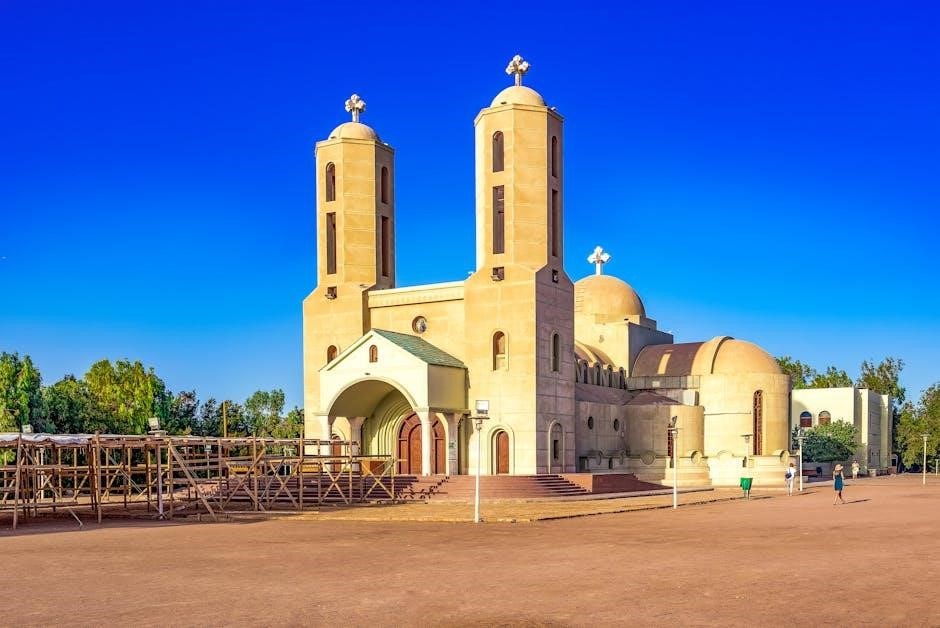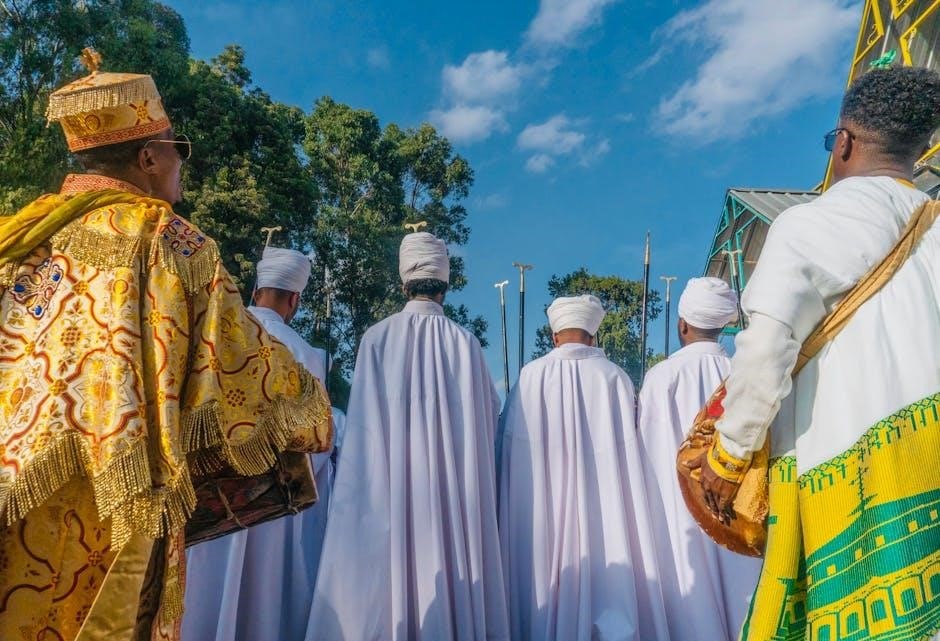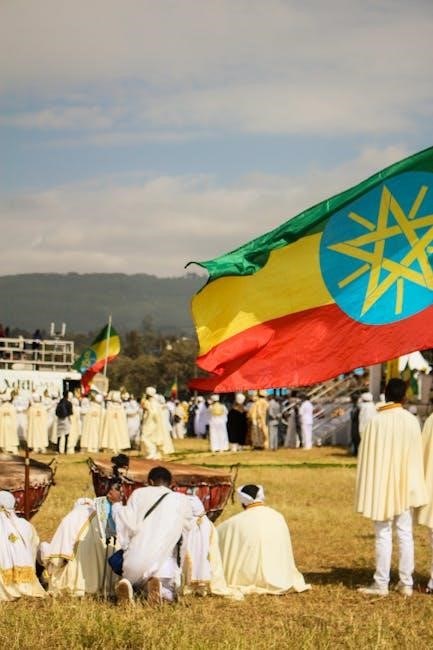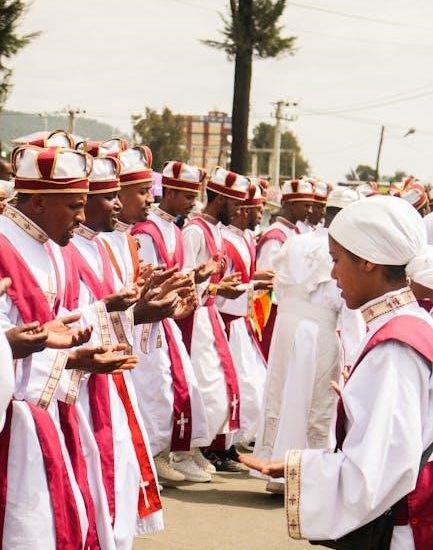The Ethiopian Orthodox Fasting Calendar 2023 outlines essential fasting periods‚ aligning with both religious and cultural practices‚ and is available in PDF format for easy reference.
1.1 Overview of the Ethiopian Orthodox Tewahedo Church
The Ethiopian Orthodox Tewahedo Church is one of the oldest Christian churches in the world‚ tracing its origins to the 1st century AD. It is the largest Christian denomination in Ethiopia and Eritrea‚ playing a central role in the cultural and spiritual lives of its adherents. The church is known for its rich liturgical traditions‚ including a unique calendar system that governs religious practices such as fasting and feast days. The Ethiopian Orthodox Church follows the Alexandrian rite and maintains a distinct theological and liturgical identity. Its practices are deeply rooted in biblical teachings and centuries of tradition‚ making it a cornerstone of Ethiopian identity and spirituality.
1.2 Importance of Fasting in the Ethiopian Orthodox Tradition
1.3 Purpose of the 2023 Fasting Calendar
The 2023 Ethiopian Orthodox Fasting Calendar serves as a comprehensive guide for followers to observe religious fasting periods accurately. It outlines the dates and durations of mandatory and optional fasts‚ ensuring adherents align their spiritual practices with the church’s traditions. The calendar helps believers prepare for significant religious events‚ fostering spiritual discipline and reflection. By providing a structured schedule‚ it enables individuals to integrate fasting into their daily lives seamlessly. Additionally‚ the calendar aligns fasting periods with both the Ethiopian and Gregorian calendars‚ making it accessible for followers worldwide. Its purpose is to strengthen faith‚ promote unity‚ and deepen the spiritual journey of the faithful through systematic observance of fasting traditions.
The 2023 Ethiopian Orthodox Fasting Calendar is designed to guide followers in observing religious fasting periods accurately. It outlines the dates and durations of mandatory and optional fasts‚ ensuring adherents align their spiritual practices with the church’s traditions. The calendar helps believers prepare for significant religious events‚ fostering spiritual discipline and reflection. By providing a structured schedule‚ it enables individuals to integrate fasting into their daily lives seamlessly. Additionally‚ the calendar aligns fasting periods with both the Ethiopian and Gregorian calendars‚ making it accessible for followers worldwide. Its purpose is to strengthen faith‚ promote unity‚ and deepen the spiritual journey of the faithful through systematic observance of fasting traditions.

Structure of the Ethiopian Orthodox Fasting Calendar
The calendar includes mandatory and optional fasting periods‚ with Wednesdays and Fridays designated as regular fasting days‚ aligning with the Gregorian and Ethiopian calendars.
2.1 Mandatory Fasting Periods
Mandatory fasting periods are central to the Ethiopian Orthodox tradition‚ ensuring adherence to religious obligations. These include Lent‚ Nativity‚ and Apostles’ fasts‚ totaling over 250 days annually. Through abstaining from food and drink‚ believers seek spiritual purification and closeness to God‚ reflecting deep devotion and commitment. The strict schedule is outlined in the 2023 PDF calendar‚ guiding followers through these sacred times. Fasting isn’t just about physical abstinence but also about mental and spiritual reflection‚ fostering a deeper connection with faith and community. These periods are non-negotiable‚ emphasizing their importance in the religious practice of the Ethiopian Orthodox Church. The calendar ensures clarity and consistency for all followers‚ both locally and internationally.
2.2 Optional Fasting Days
Optional fasting days in the Ethiopian Orthodox tradition provide followers with additional opportunities for spiritual growth and reflection. These days‚ such as Wednesdays and Fridays throughout the year‚ are less stringent than mandatory fasts but are highly encouraged. They allow believers to deepen their faith voluntarily‚ fostering a personal connection with their spirituality. While not compulsory‚ these days are widely observed and are considered a way to honor religious customs. The 2023 PDF calendar highlights these optional periods‚ offering guidance for those who wish to participate. By incorporating these days‚ individuals can enhance their spiritual discipline and draw closer to God‚ even when not required by church law. This flexibility makes the fasting practice accessible and meaningful for a broader community.
2.3 Wednesdays and Fridays as Fasting Days
Wednesdays and Fridays are traditionally observed as fasting days in the Ethiopian Orthodox Church‚ reflecting a deep-rooted spiritual practice. These days commemorate significant events: Wednesday honors the betrayal of Christ‚ while Friday remembers His crucifixion. Fasting on these days typically involves abstaining from meat and dairy products‚ with some opting for a strict vegan diet. The 2023 PDF calendar emphasizes these days‚ though exceptions exist‚ such as during certain feast periods. This consistent practice fosters a routine of reflection and penance‚ strengthening the connection between the faithful and their religious heritage. By adhering to these weekly fasts‚ believers cultivate self-discipline and devotion‚ aligning with the church’s teachings and traditions. This practice is a cornerstone of the Ethiopian Orthodox fasting regimen‚ promoting both individual and communal spiritual growth.
2.4 Alignment with the Gregorian Calendar
The Ethiopian Orthodox fasting calendar for 2023 aligns with the Gregorian calendar‚ providing a structured framework for adherents to observe fasting periods. The Ethiopian calendar year 2016 overlaps with the Gregorian years 2023 and 2024‚ ensuring that fasting days and religious holidays are accurately mapped. This alignment is crucial for followers to synchronize their spiritual practices with global date systems. The PDF version of the calendar includes both Ethiopian and Gregorian dates‚ making it accessible for international use. This dual-system approach helps the congregation navigate their religious obligations seamlessly. The alignment also facilitates unity among followers worldwide‚ ensuring consistency in observing fasting days and celebrations. This integration of calendars is a practical tool for maintaining religious discipline and communal harmony.

Key Fasting Periods in the Ethiopian Orthodox Calendar 2023
The calendar includes major fasting periods like Lent‚ Nativity Fast‚ Apostles’ Fast‚ and the Assumption of Mary‚ each holding deep spiritual significance and communal observance.
3.1 Lent (Hudadi or Abib)
Lent‚ known as Hudadi or Abib in the Ethiopian tradition‚ is a 56-day fasting period leading up to Easter. It commemorates Jesus’ 40-day fast in the wilderness‚ extended by 16 days for preparation and reflection. The fast involves abstaining from meat‚ dairy‚ and egg products‚ and adhering to strict prayer routines. Wednesdays and Fridays are emphasized as days of heightened observance. This period is crucial for spiritual renewal‚ self-reflection‚ and strengthening one’s faith. The Ethiopian Orthodox Church encourages believers to engage deeply in liturgical services and acts of charity during this sacred time.
3.2 Nativity Fast (Tsome Nenewe)
The Nativity Fast‚ or Tsome Nenewe‚ is a 40-day fasting period in preparation for the celebration of the Nativity of Jesus. It begins on November 25th and concludes on January 6th‚ aligning with the Ethiopian Orthodox calendar. This fast mirrors the 40-day journey of the Holy Family into Egypt and emphasizes prayer‚ reflection‚ and purification. Followers are expected to abstain from meat‚ dairy‚ and eggs‚ focusing on vegan meals and heightened spiritual practices. The fast culminates in the joyous celebration of Ganna‚ the Ethiopian Christmas‚ which is marked with liturgical services‚ communal feasting‚ and traditional songs and dances.
3.3 Apostles’ Fast (Tsome Hawariat)
The Apostles’ Fast‚ or Tsome Hawariat‚ is a period of fasting and reflection in the Ethiopian Orthodox Church that begins after Pentecost and extends for varying lengths depending on the year. It honors the twelve apostles of Jesus Christ and their missionary work. The fast typically lasts between 10 to 40 days‚ concluding on the feast day of St. Peter and St. Paul (Sallasie). During this time‚ believers abstain from meat‚ dairy‚ and eggs‚ focusing on prayer‚ meditation‚ and charitable acts. The fast is seen as a means to strengthen faith‚ seek forgiveness‚ and emulate the apostles’ commitment to spreading the Gospel. It culminates in a joyful celebration‚ emphasizing community worship and spiritual renewal.
3.4 Assumption of the Virgin Mary Fast (Tsome Sellassie)
The Assumption of the Virgin Mary Fast‚ or Tsome Sellassie‚ is a 15-day fasting period in the Ethiopian Orthodox Church‚ concluding on August 22 (Gregorian calendar) or Nehase 16 (Ethiopian calendar). This fast honors the dormition of the Virgin Mary and her assumption into heaven. It is a time of intense spiritual reflection‚ prayer‚ and penance‚ during which believers abstain from meat‚ dairy‚ and eggs. The fast emphasizes the importance of Mary’s role in the life of Christ and the Church‚ fostering a deeper connection to her intercession. The period culminates in a grand festal celebration‚ highlighting Mary’s significance in Ethiopian Orthodox devotion and tradition.
3.5 Nineveh Fast (Tsome Arbaite)
The Nineveh Fast‚ or Tsome Arbaite‚ is a three-day fasting period in the Ethiopian Orthodox Church‚ typically observed in January‚ commemorating the repentance of the people of Nineveh at the preaching of Prophet Jonah. This fast is a time of deep reflection‚ prayer‚ and penance‚ emphasizing the importance of seeking forgiveness and spiritual renewal. Believers abstain from meat‚ dairy‚ and eggs‚ focusing on simplicity and humility. The fast is not mandatory but is highly encouraged‚ especially for those seeking to strengthen their faith. It is a powerful reminder of God’s mercy and the transformative power of repentance‚ aligning with the Church’s emphasis on spiritual preparation and communal worship.

Significance of Fasting in the Ethiopian Orthodox Church
Fasting in the Ethiopian Orthodox Church signifies spiritual growth‚ self-control‚ and devotion‚ fostering a deeper connection with God and communal unity through shared religious practices and reflection.
4.1 Spiritual Preparation and Reflection
Fasting serves as a profound means of spiritual preparation and reflection‚ enabling believers to focus on their faith and deepen their connection with God. By abstaining from worldly indulgences‚ adherents create space for meditation‚ prayer‚ and introspection. This practice encourages humility‚ self-examination‚ and a retreat from sinful tendencies‚ fostering a mindset centered on divine grace and redemption. The Ethiopian Orthodox Church teaches that fasting is not merely physical but a spiritual discipline that purifies the heart and mind. Through this‚ the faithful emulate the examples of biblical figures and saints‚ seeking spiritual renewal and a closer walk with God. This period is vital for personal and communal spiritual growth‚ aligning with the Church’s rich liturgical traditions.
4.2 Physical and Mental Discipline
Fasting in the Ethiopian Orthodox tradition cultivates physical and mental discipline‚ teaching believers to master their desires and appetites. By adhering to dietary restrictions and abstaining from certain pleasures‚ individuals develop self-control and resilience. This practice strengthens the will‚ enabling followers to prioritize spiritual growth over worldly comforts. The mental discipline gained through fasting helps believers maintain focus during prayers and liturgical services. The Church emphasizes that this discipline is not about bodily punishment but about harmonizing the body and soul in devotion to God. Through this practice‚ the faithful learn to embrace simplicity and moderation‚ fostering a healthier relationship with their physical and mental well-being. This discipline is seen as a vital component of the holistic transformative power of fasting.
4.3 Community Unity and Shared Worship
Fasting in the Ethiopian Orthodox Church fosters a strong sense of community unity‚ as believers collectively observe the same periods of abstinence and shared worship. This communal practice strengthens bonds among the faithful‚ creating a shared spiritual journey. During fasting seasons‚ congregations gather for extended prayers‚ liturgies‚ and reflections‚ deepening their collective devotion. The act of fasting together emphasizes mutual support and solidarity‚ as individuals encourage one another in their spiritual discipline. This shared experience reinforces the Church’s role as a united body of Christ‚ where worship and fasting are not solitary acts but communal expressions of faith and commitment. Through this unity‚ believers find strength in their shared purpose and spiritual growth.
4.4 Biblical and Historical Foundations
The Ethiopian Orthodox fasting traditions are deeply rooted in biblical teachings and historical practices. Fasting is seen as a means of emulating Christ’s 40-day fast in the wilderness and the practices of early Christian communities. The Church’s fasting calendar aligns with key scriptural events‚ such as Lent‚ which mirrors Christ’s temptation‚ and the Nativity Fast‚ preparing for Christmas. Historically‚ the Ethiopian Orthodox Church has maintained these fasting periods since its establishment‚ reflecting a commitment to apostolic traditions. The structure of the fasting calendar is based on biblical injunctions and the teachings of the Church Fathers‚ ensuring a continuity of faith and practice across centuries. This historical and biblical foundation underscores the significance of fasting as a spiritual discipline in the Ethiopian Orthodox tradition.

Practical Guidance for Observing the Fasting Calendar
Plan meals‚ track fasting days using PDF calendars or apps‚ and prepare spiritually. Adhere to dietary rules‚ prioritize prayer‚ and consult parish priests for exceptions or guidance.
5.1 Preparing for Fasting Periods
Preparing for fasting involves planning meals‚ tracking fasting days using PDF calendars or apps‚ and ensuring spiritual readiness. Seek blessings from clergy‚ reflect on past fasting experiences‚ and involve family. Begin by detoxing physically and mentally‚ focusing on prayer and reflection. Stock up on fasting-friendly foods and adjust routines to accommodate worship times. Engage in pre-fasting confession and community prayers to strengthen resolve. Start with a prayerful mindset‚ ensuring adherence to dietary and liturgical guidelines. Consulting parish priests for guidance is crucial‚ especially for newcomers or those with health concerns. This holistic approach ensures a meaningful and disciplined fasting period.
5.2 Dietary Rules and Restrictions
Ethiopian Orthodox fasting involves strict dietary rules‚ primarily abstaining from meat‚ dairy‚ eggs‚ and fish. Only vegan foods are permitted‚ excluding even honey and wine. Fasting periods require avoiding olive oil on certain days‚ emphasizing simple‚ plant-based meals. The focus is on reducing food intake and avoiding luxurious dishes. Detailed guidelines are provided in the Ethiopian Orthodox Fasting Calendar 2023 PDF‚ ensuring adherence to traditional practices. These rules foster self-control and devotion‚ aligning with the church’s teachings on humility and penance. Observants are encouraged to consult parish resources for specific instructions‚ ensuring a spiritually enriching fasting experience.
5.3 Role of Prayer and Liturgy
Prayer and liturgy are integral to the Ethiopian Orthodox fasting experience‚ serving as spiritual pillars that strengthen devotion. The fasting calendar 2023 PDF emphasizes the importance of prayer as a means to deepen faith and seek divine guidance. During fasting periods‚ adherents engage in extended prayers‚ recitation of the Psalms‚ and participation in liturgical services. The Divine Liturgy‚ a central worship practice‚ is often conducted with additional prayers and hymns to reflect the solemnity of fasting. The church encourages believers to maintain a prayerful mindset‚ combining it with fasting to achieve spiritual purification. This harmonious blend of prayer and fasting fosters a deeper connection with God‚ preparing the faithful for significant religious events and personal spiritual growth.
5.4 Exceptions and Special Considerations
The Ethiopian Orthodox fasting calendar 2023 PDF acknowledges exceptions for certain individuals‚ such as the sick‚ pregnant women‚ and travelers‚ who may require dispensation. Clergy play a crucial role in interpreting fasting rules for these cases. Additionally‚ fasting may be adjusted during special events or when feast days coincide with fasting periods. The church emphasizes the importance of prayer and almsgiving for those unable to fast. Parish priests often provide guidance to ensure adherents follow the rules appropriately. This flexibility ensures that fasting remains a spiritual practice accessible to all‚ while maintaining its deeper purpose of communion with God and community unity. Proper consultation with religious leaders is encouraged to navigate these exceptions effectively.

Digital Resources for the Ethiopian Orthodox Fasting Calendar 2023
The Ethiopian Orthodox Fasting Calendar 2023 is available as PDF downloads‚ offering online tools‚ apps‚ and parish guidelines for easy digital access and adherence.
6.1 PDF Downloads and Printables
The Ethiopian Orthodox Fasting Calendar 2023 is widely available as downloadable PDFs‚ offering a convenient and accessible format for followers. These PDF resources detail key fasting dates‚ religious holidays‚ and liturgical periods‚ ensuring adherents can plan their spiritual observances effectively. The PDFs are often provided by official church websites‚ community platforms‚ and religious organizations‚ making them easily shareable and printable. They include detailed charts‚ explanations of fasting rules‚ and alignments with both the Ethiopian and Gregorian calendars. This format allows believers to carry the calendar on their devices or print it for personal or communal use‚ ensuring they stay informed and connected to their faith traditions throughout the year.
6.2 Online Calendar Tools and Apps
Online tools and apps provide innovative ways to track the Ethiopian Orthodox Fasting Calendar 2023‚ offering digital solutions for modern adherents. These platforms feature interactive calendars‚ push notifications for fasting periods‚ and customizable reminders. Apps like the newly introduced 2023 fasting calendar app simplify understanding fasting rules and align with both Ethiopian and Gregorian dates. They often include liturgical readings‚ prayers‚ and historical context‚ enhancing spiritual engagement. Available on multiple devices‚ these tools cater to global followers‚ ensuring they stay connected to their faith practices. They also offer sharing options‚ fostering community among users. Such digital resources complement PDF downloads‚ providing versatile access to the fasting calendar for all believers.
6.3 Parish and Church Guidelines
Parishes and churches provide detailed guidelines to help followers observe the Ethiopian Orthodox Fasting Calendar 2023. These guidelines are often distributed in PDF formats or through church bulletins‚ ensuring clarity on fasting rules and dates. Local priests may offer specific instructions tailored to community needs‚ emphasizing the importance of adhering to traditional practices. Some churches also provide liturgical resources‚ such as prayer books and schedules‚ to support believers during fasting periods. Additionally‚ many parishes organize communal prayers and educational sessions to deepen understanding and foster unity among the congregation. Consulting with parish leaders is encouraged to ensure proper observance‚ as local customs may vary slightly from the general calendar. These guidelines serve as a vital link between the broader church traditions and individual spiritual practices.
The Ethiopian Orthodox Fasting Calendar 2023 PDF serves as a vital guide‚ fostering spiritual growth and unity among followers through its structured fasting periods and traditions.

7.1 Summary of the Fasting Calendar’s Importance
The Ethiopian Orthodox Fasting Calendar 2023 PDF provides a structured guide for followers‚ outlining over 250 fasting days annually. It ensures adherence to spiritual practices‚ enhancing devotion and self-reflection. The calendar aligns with both Ethiopian and Gregorian dates‚ offering clarity for global followers. By detailing mandatory and optional fasts‚ it fosters unity among believers‚ reinforcing communal worship and traditions. This resource is essential for understanding the cultural and religious significance of fasting‚ aiding individuals in their spiritual journeys while maintaining the church’s rich heritage.
7.2 Encouragement for Observance and Participation
Observing the Ethiopian Orthodox Fasting Calendar 2023 is a profound way to deepen spiritual growth and connect with the rich traditions of the faith. By participating in fasting periods‚ believers strengthen their relationship with God and cultivate self-discipline. The calendar’s structured guidelines‚ available in PDF format‚ make it accessible for followers worldwide to stay aligned with the church’s teachings. Encouraging active involvement fosters a sense of community and shared purpose‚ uniting believers in prayer and reflection. Embracing these practices not only honors the church’s heritage but also nurtures personal faith‚ making the fasting calendar an invaluable tool for spiritual enrichment and renewal throughout the year.





